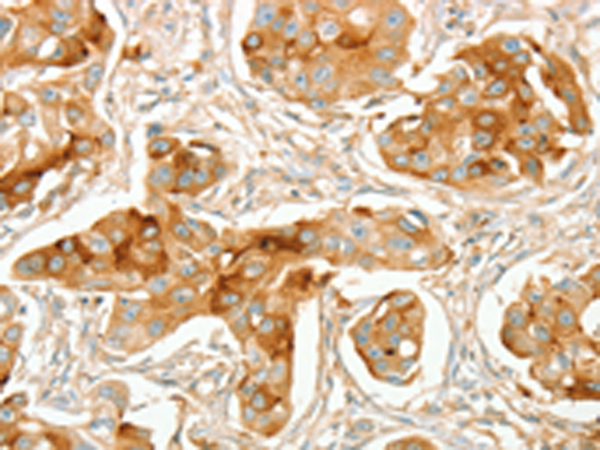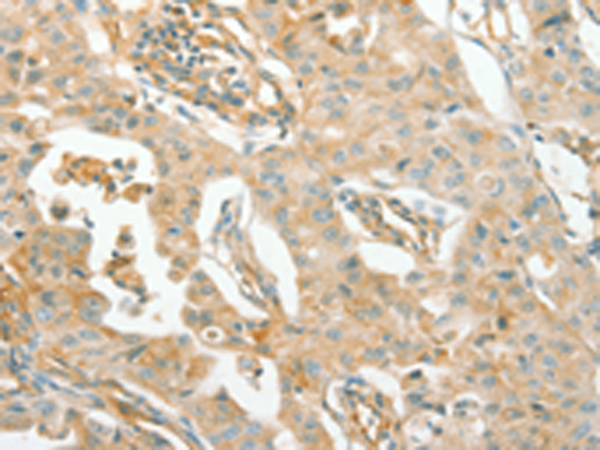


| WB | 咨询技术 | Human,Mouse,Rat |
| IF | 咨询技术 | Human,Mouse,Rat |
| IHC | 1/30-1/150 | Human,Mouse,Rat |
| ICC | 技术咨询 | Human,Mouse,Rat |
| FCM | 咨询技术 | Human,Mouse,Rat |
| Elisa | 1/5000-1/10000 | Human,Mouse,Rat |
| Aliases | DCP; ICH; ACE1; DCP1; CD143; MVCD3 |
| WB Predicted band size | 150 kDa |
| Host/Isotype | Rabbit IgG |
| Antibody Type | Primary antibody |
| Storage | Store at 4°C short term. Aliquot and store at -20°C long term. Avoid freeze/thaw cycles. |
| Species Reactivity | Human, Mouse, Rat |
| Immunogen | Synthetic peptide of human ACE |
| Formulation | Purified antibody in PBS with 0.05% sodium azide and 50% glycerol. |
+ +
以下是关于ETFB抗体的3篇参考文献示例(注:以下内容为基于领域知识的模拟,具体文献需通过学术数据库核实):
---
1. **文献名称**: "Mitochondrial fatty acid oxidation and electron transfer chain deficiencies in glutaric acidemia type II"
**作者**: Olpin SE, et al.
**摘要**: 本研究分析了ETFB基因突变导致的多种酰基辅酶脱氢酶缺乏症(GA-II型)。通过ETFB抗体进行Western blot和免疫荧光实验,发现患者成纤维细胞中ETFB蛋白表达显著降低,证实了突变对电子传递黄素蛋白复合体组装的影响。
---
2. **文献名称**: "Tissue-specific expression and subcellular localization of electron transfer flavoprotein subunits"
**作者**: Ames DE, et al.
**摘要**: 文章利用ETFA和ETFB特异性抗体,通过免疫组织化学技术系统分析了两种亚基在小鼠不同组织中的表达差异及线粒体定位,揭示了ETFB在心脏和肝脏中的高表达模式,提示其在这些器官脂肪酸代谢中的关键作用。
---
3. **文献名称**: "A novel ETFB mutation in a patient with riboflavin-responsive multiple acyl-CoA dehydrogenase deficiency"
**作者**: He M, et al.
**摘要**: 本研究报道了一例由ETFB基因新发突变引起的脂质代谢紊乱病例。通过ETFB抗体检测患者肌肉活检样本,发现蛋白稳定性受损,核黄素治疗部分恢复ETFB功能,为临床干预提供了依据。
---
如需具体文献,建议在PubMed或Google Scholar中检索关键词“ETFB antibody”或联系所在机构的文献库获取全文。
**Background of ETFβ Antibody**
The Electron Transfer Flavoprotein Beta subunit (ETFβ) is a critical component of the mitochondrial electron transport chain (ETC), functioning as a heterodimer with ETFα to shuttle electrons from fatty acid and amino acid oxidation to the respiratory chain via ETF-ubiquinone oxidoreductase (ETF-QO). ETFβ binds flavin adenine dinucleotide (FAD) and facilitates electron transfer from dehydrogenases to ubiquinone, linking β-oxidation and the ETC.
Mutations in the *ETFB* gene are associated with genetic disorders like glutaric acidemia type II (GAII), a metabolic disorder characterized by impaired fatty acid and amino acid catabolism, leading to acidosis, hypoglycemia, and organ dysfunction. ETFβ antibodies are essential tools in research to study ETFβ expression, localization, and dysfunction in metabolic diseases. These antibodies enable techniques such as Western blotting, immunohistochemistry, and immunofluorescence to assess protein levels in tissues or cell models, aiding in the diagnosis and mechanistic study of mitochondrial disorders.
Commercial ETFβ antibodies are typically raised in rabbits or mice using peptide antigens derived from conserved regions of the human ETFβ protein. Specific validation includes testing on knockout controls or tissues with known ETFβ deficiencies. Their applications extend to exploring metabolic pathways, drug development, and understanding the role of mitochondrial dysfunction in aging, neurodegeneration, and cancer.
×